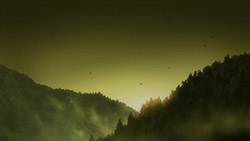 |
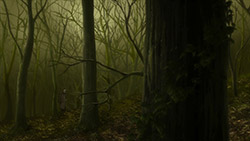 |
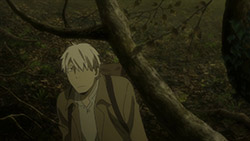 |
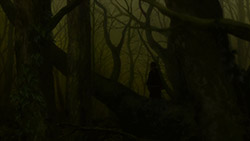 |
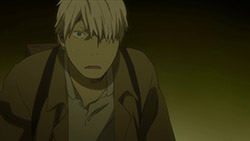 |
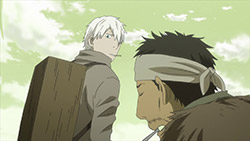 |
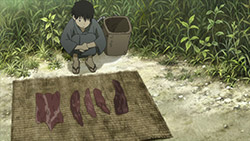 |
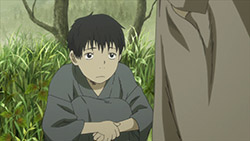 |
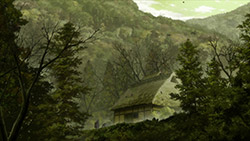 |
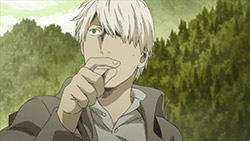 |
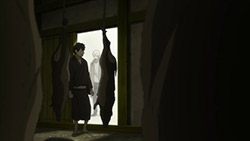 |
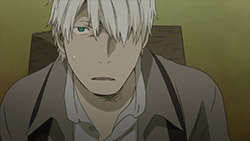 |
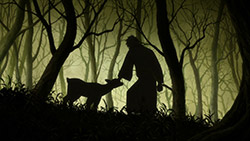 |
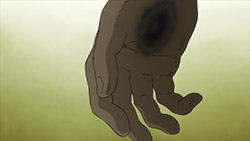 |
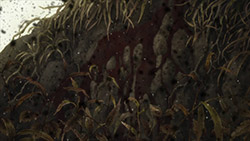 |
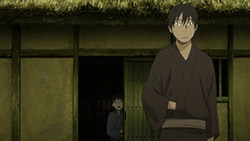 |
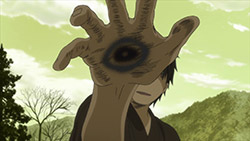 |
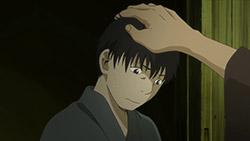 |
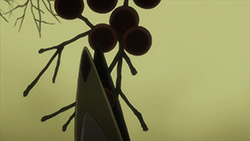 |
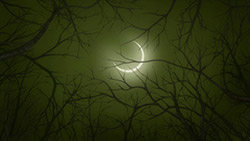 |
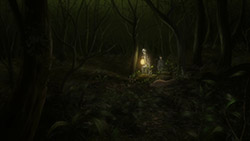 |
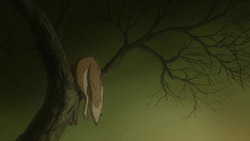 |
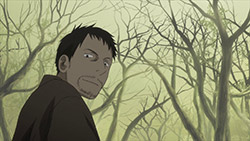 |
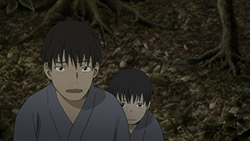 |
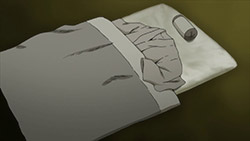 |
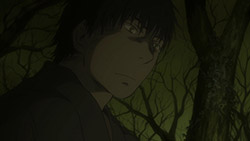 |
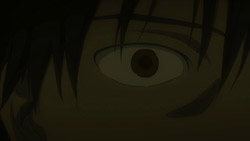 |
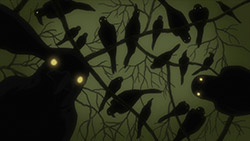 |
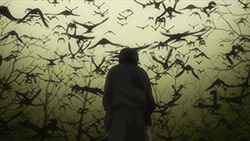 |
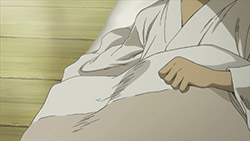 |
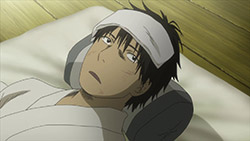 |
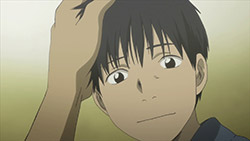 |
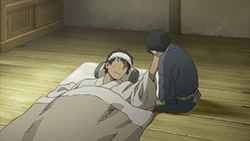 |
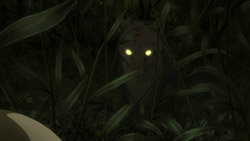 |
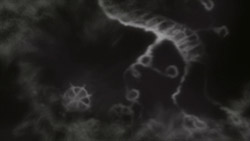 |
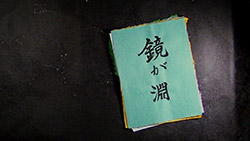 |
「(夜 を 撫でる 手」 (Yoru wo Naderu Te)
“The Hand that Caresses the Night”
Mushishi is re-introducing itself to the world, shade by shade.
To follow up on my analogy of last week, Mushishi as a series seems more than ever like a painting – one where we’re privileged to see the brushstrokes applied every week. Every color is part of what defines the series as a whole, and more so than with almost any other anime they each maintain a distinct presence. No episode or chapter uses the same palette as the last or the next. When it’s complete we do see the picture as a whole, only fully realizing then what it was the artist was trying to create – yet we maintain a distinct image of every blue, red, green and black that makes up the final image.
“The Hand That Caresses the Night” definitely brings us a shade of Mushishi that we haven’t much seen since “Zoku Shou” began, but one which viewers of the first series and readers of the manga can recognize well. This can be a very scary series, in that peculiarly Japanese way – “unsettling” is the best word for it in my view. The detach which accompanies the seemingly sentimental side of the series has a similar effect here, making these frightening moments impactful in quite a different way than with conventional horror anime. Mushishi calmly peels back the cover of darkness to reveal that which unnerves and disquiets us, both in the natural world and in our own nature.
This chapter also finds Ginko more at the center of the action than he has been for most of the season. It begins with him trekking through a forest in the mountains (so many of them do, don’t they?) at night. He detects a sweet smell in the air, initially mistaking it for Kouki – but when a sour note joins, he realizes it’s something quite different. In a rare occurrence we see Ginko frozen with terror, unable to move, as a human appears in the distance, a shadow among the trees. Upon realizing that Ginko is a human, he drily offers an “I’ll let you live” and the mysterious paralysis leaves Ginko – though the disquiet of the encounter and a residual weariness do not.
That figure in the night turns out to be local hunter Tatsu (Uchiyama Kouki, a rare appearance by a popular seiyuu in Mushishi), a young man who lives with his little brother Usawa (played by child actor Kijima Yasunari, another in Mushishi’s welcome practice of casting real children in child roles). No one will buy the meat the little boy sells at the market every day because of its rotten smell, which even the meat from animals freshly killed by Tatsu shares. This, Ginko realizes, is the result of Fuki – a kind of dark mirror image of Kouki, the result of what happens when Kouki decays. It’s toxic, but among those that can tolerate it, it grants them a special power – an eye-shaped mark in the palm that emanates the sweet/rotten smell which attracts and binds the prey.
If you’re a believer in the symbolic side of this series, arrogance is certainly the dominant theme of this story. It’s the arrogance that makes Tatsu believe he’s “King” of the mountain because of his ability – the same arrogance that slowly took over his father, changing and warping him into something cruel and vain. This is a very dark tale indeed – that father simply disappears one day, and Ginko tells us that he’s wandering, lost and without soul or physical form, among the mountains. Tatsu himself – who refuses the Kouki that would drive the blight from his body, even as his brother is cured by it – is shot by hunters (a rare appearance by a firearm in this series) and then has his arm gnawed off by birds once the fearful eye symbol on his hand is covered. It’s the price he must pay for his arrogance – the toll required to gain his self back and not follow the path of his father. Is it just or fair? No – but these are not factors that play a major role in Mushishi. Mushi, like the series itself, are unsentimental.
I wouldn’t be able to tell you which of the many sides of Mushishi I like best – as distinct as they are, they’re also inseparable. But I can say that episodes like this one are among the most personally affecting for me. Perhaps the most remarkable quality of this remarkable series is the ability to completely transport you mind and soul into its world, and this sort of chapter does that better than any other. I can’t say how pleased (and frankly a little surprised) I am that Artland is still able to deliver stunningly beautiful and detailed backgrounds and solid animation, because that’s a vital component of this immersive effect – along, of course, with the judicious use of Masuda Toshio’s music and the extremely naturalistic performances of the cast (all those children being a major part of this). Uchiyama Kouki is about as good a choice as you could make if you were going to cast a “regular” here – while recognizable, he’s about as naturalistic as any fashionable seiyuu.
All in all, this episode was – again – just about flawless. Every piece fits perfectly and works in concert to take the audience to a strange yet oddly familiar, frightening yet still beautiful place. This is something Mushishi does better than any anime of the moment, and perhaps better than any anime of the 21st Century. It’s the result of taking what’s already a visionary and unique manga and using the power of the anime medium to enhance those qualities – which should, after all, be the goal of every manga adaptation.

The production value in this episode blew me away. The detailing, the colouring, the somber mood, everything.
After 3 episodes, we finally got an episode where Ginko took the center stage instead of acting as a story-teller of sort. And man, what an episode it was. From the get go, there’s this feeling of dread and lost, especially since the very first scenes are of setting sun and leafless trees. The mushi-of-the-day also matched the mood perfectly, a mushi that is a by-product of life; decays.
I am so very glad that Artland decided to bring Mushishi back to us after all these years.
This episode gave me chills and goosebumps all over my body and it’s what I love about Mushishi – it doesn’t need top-notch CG or fast-paced action to deliver its message… its simplicity in animation, the subtle changes in expressions combined with the flawless writing and narration is what personally, makes Mushishi so enjoyable for me to watch every week.
The backstory about the father, how Tatsu and his brother recalled the changes in their father before his disappearance… the images of the father becoming transparent, him walking ahead with no shadow behind him and his body vanishing from his bed, leaving his clothes behind… it’s hard to forget! Only Mushishi can make something so simple look so terrifying.
Thank you for blogging Mushishi – it’s a delight to read your thoughts!
Guardian Enzo: kudos to you. I’ve always loved Mushishi, and I adore the new season so far. However these reviews have really made me look at each episode in a different light and have thus enjoyed them thoroughly. I’ve gotten into the habit now of rewatching each episode after reading your review for this reason.
Well, that sure is going to give me nightmare tonight.
Thank you Tomer and Razorstain – very kind words indeed. If these posts are convincing you to watch Mushishi twice, then I consider them a success!
An unusual Anime, worth far more than its investment of time to enjoy.
Thanks for covering Guardian Enzo…
After years of watching animes that slice limbs like it’s sushi, this was the first time I actually felt scared during an episode. I was with Tatsu every second, especially after he’d gotten shot. I hid with him, arm bleeding, desperately waiting for the night to end, then sighed with relief when his brother called out his name–only to see the crows descend.
Man, I hope that doesn’t appear in my dreams.
Goosebumps baby! That’s what I felt all throughout the episode. I already read this in the manga and I don’t know how Artland have managed to convert fear and dread into animation. This was superb!